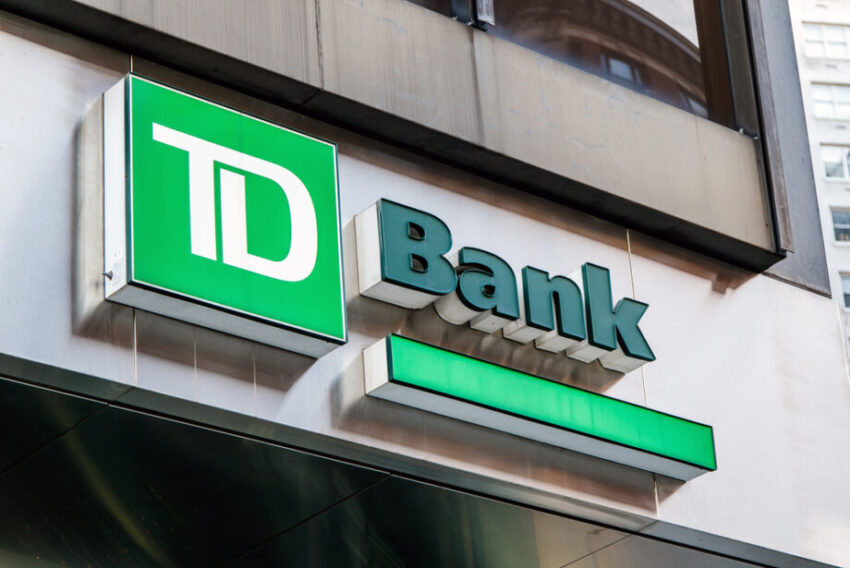WASHINGTON
 TD Bank N.A. (TDBNA), the 10th largest U.S. bank, and its parent company, TD Bank US Holding Company (TDBUSH), pleaded guilty Thursday and agreed to pay over $1.8 billion in penalties to settle a Justice Department investigation into violations of the Bank Secrecy Act (BSA) and money laundering.
TD Bank N.A. (TDBNA), the 10th largest U.S. bank, and its parent company, TD Bank US Holding Company (TDBUSH), pleaded guilty Thursday and agreed to pay over $1.8 billion in penalties to settle a Justice Department investigation into violations of the Bank Secrecy Act (BSA) and money laundering.
TDBNA admitted to conspiring to neglect anti-money laundering (AML) requirements, failing to submit accurate Currency Transaction Reports (CTRs), and laundering money. TDBUSH admitted to causing TDBNA’s failures in maintaining an AML program and filing accurate CTRs.
“By making its services convenient for criminals, TD Bank became one,” said Attorney General Merrick B. Garland. “Today, TD Bank also became the largest bank in U.S. history to plead guilty to Bank Secrecy Act program failures, and the first US bank in history to plead guilty to conspiracy to commit money laundering. TD Bank chose profits over compliance with the law — a decision that is now costing the bank billions of dollars in penalties. Let me be clear: our investigation continues, and no individual involved in TD Bank’s illegal conduct is off limits.”
The settlement is part of a coordinated effort with the Federal Reserve, the Treasury Department’s Office of the Comptroller of the Currency (OCC), and the Financial Crimes Enforcement Network (FinCEN).
![]() TD Bank N.A. (TDBNA), the 10th largest bank in the United States, and its parent company TD Bank US Holding Company (TDBUSH) (together with TDBNA, TD Bank) pleaded guilty today and agreed to pay over $1.8 billion in penalties to resolve the Justice Department’s investigation into violations of the Bank Secrecy Act (BSA) and money laundering.
TD Bank N.A. (TDBNA), the 10th largest bank in the United States, and its parent company TD Bank US Holding Company (TDBUSH) (together with TDBNA, TD Bank) pleaded guilty today and agreed to pay over $1.8 billion in penalties to resolve the Justice Department’s investigation into violations of the Bank Secrecy Act (BSA) and money laundering.
TDBNA pleaded guilty to conspiring to fail to maintain an anti-money laundering (AML) program that complies with the BSA, fail to file accurate Currency Transaction Reports (CTRs), and launder money. TDBUSH pleaded guilty to causing TDBNA to fail to maintain an AML program that complies with the BSA and to fail to file accurate CTRs.
TD Bank’s guilty pleas are part of a coordinated resolution with the Board of Governors of the Federal Reserve Board (FRB), as well as the Treasury Department’s Office of the Comptroller of the Currency (OCC) and Financial Crimes Enforcement Network (FinCEN).
“For years, TD Bank starved its compliance program of the resources needed to obey the law. Today’s historic guilty plea, including the largest penalty ever imposed under the Bank Secrecy Act, offers an unmistakable lesson: crime doesn’t pay — and neither does flouting compliance,” said Deputy Attorney General Lisa Monaco. “Every bank compliance official in America should be reviewing today’s charges as a case study of what not to do. And every bank CEO and board member should be doing the same. Because if the business case for compliance wasn’t clear before — it should be now.”
“For nearly a decade, TD Bank failed to update its anti-money laundering compliance program to address known risks. As bank employees acknowledged in internal communications, these failures made the bank an ‘easy target’ for the ‘bad guys.’ These failures also allowed corrupt bank employees to facilitate a criminal network’s laundering of tens of millions of dollars,” said Principal Assistant Attorney General Nicole M. Argentieri, head of the Justice Department’s Criminal Division. “U.S. financial institutions are the first line of defense against money laundering and illicit finance. When they participate in crime rather than prevent it, we will not hesitate to hold them accountable to the fullest extent of the law.”
“TD Bank prioritized growth and convenience over following its legal obligations,” said U.S. Attorney Philip R. Sellinger for the District of New Jersey. “As a result of staggering and pervasive failures in oversight, it willfully failed to monitor trillions of dollars of transactions – including those involving ACH transactions, checks, high-risk countries, and peer-to-peer transactions – which allowed hundreds of millions of dollars from money laundering networks to flow through the bank, including for international drug traffickers. The bank was aware of these risks and failed to take steps to protect against them, including for two networks prosecuted in New Jersey and elsewhere – one that dumped piles of cash on the bank’s counters and another that allegedly withdrew amounts from ATMs 40 to 50 times higher than the daily limit for personal accounts.”
From January 2014 to October 2023, court documents reveal that TD Bank had persistent and widespread deficiencies in its U.S. anti-money laundering (AML) policies, procedures, and controls but failed to take corrective action. Instead, senior executives imposed a strict budget policy, known internally as the “flat cost paradigm,” which prevented any budget increases year-over-year, despite the bank’s growing profits and risk levels during that time. While TD Bank’s AML program seemed adequate on paper, it had significant and widespread flaws that made the bank an “easy target” for financial criminals.
Over the past decade, TD Bank’s federal regulators and internal audit team repeatedly flagged issues with its transaction monitoring program, a crucial part of an effective anti-money laundering (AML) system for detecting and reporting suspicious activity.
However, from 2014 to 2022, the program remained largely unchanged, failing to address known deficiencies, emerging money laundering risks, or the bank’s new products and services. For years, TD Bank chose not to properly fund or staff its AML program, delaying or canceling necessary projects in favor of maintaining a “flat cost paradigm” and prioritizing the “customer experience.”
During this period, TD Bank deliberately chose not to automatically monitor a significant portion of its transactions, including most domestic automated clearinghouse (ACH) transactions, check activities, and other types, leaving 92% of all transaction volume unmonitored between January 1, 2018, and April 12, 2024—about $18.3 trillion in total. From at least 2014 to late 2022, the bank did not introduce new monitoring scenarios or make significant changes to existing ones. It also launched new products like Zelle without ensuring proper monitoring, failed to adequately track transactions linked to high-risk countries, instructed branches to stop reporting suspicious customers, and allowed over $5 billion in activity in accounts slated for closure.
The documents noted the following allegations:
- TD Bank’s anti-money laundering (AML) failures made it easy for criminals, as its employees noted.
- These failures allowed three money laundering networks to transfer over $670 million through TD Bank accounts between 2019 and 2023.
- One network laundered more than $470 million from January 2018 to February 2021 by making large cash deposits into nominee accounts. The operators gave employees over $57,000 in gift cards to keep processing the transactions. Despite suspicious cash deposits exceeding $10,000, required reports did not identify the individuals conducting the transactions.
- From March 2021 to March 2023, a high-risk jewelry business moved nearly $120 million through shell accounts before the bank reported the suspicious activity.
- In a third scheme, funds were deposited in the U.S. and quickly withdrawn using ATMs in Colombia. Five TD Bank employees helped the network by issuing dozens of ATM cards, facilitating the laundering of approximately $39 million.
- The Justice Department has charged over two dozen individuals, including two bank insiders, in connection with these schemes.
- Under its plea agreement, TD Bank must continue cooperating with ongoing investigations into the individuals involved.
- Under the plea agreement, TD Bank will forfeit $452.4 million and pay a criminal fine of $1.43 billion, totaling nearly $1.89 billion in penalties.
The bank has also agreed to hire an independent compliance monitor for three years and improve its AML compliance program.
Additionally, TD Bank has reached separate agreements with the Federal Reserve, the Office of the Comptroller of the Currency (OCC), and the Financial Crimes Enforcement Network (FinCEN), with $123.5 million of the forfeiture credited toward the Federal Reserve’s settlement.
The investigation involved the IRS Criminal Investigation, the Federal Deposit Insurance Corporation Office of Inspector General, and the Drug Enforcement Administration.
Trial Attorneys D. Zachary Adams and Chelsea R. Rooney of the Criminal Division’s Money Laundering and Asset Recovery Section (MLARS) and Assistant U.S. Attorneys Mark J. Pesce and Angelica Sinopole for the District of New Jersey prosecuted the case.

